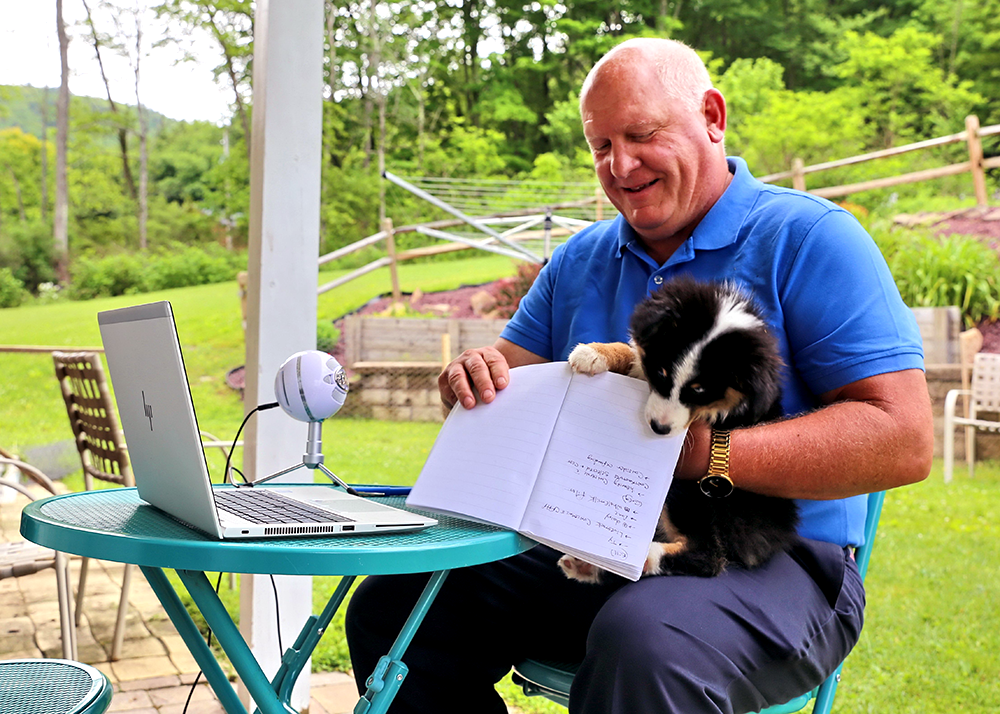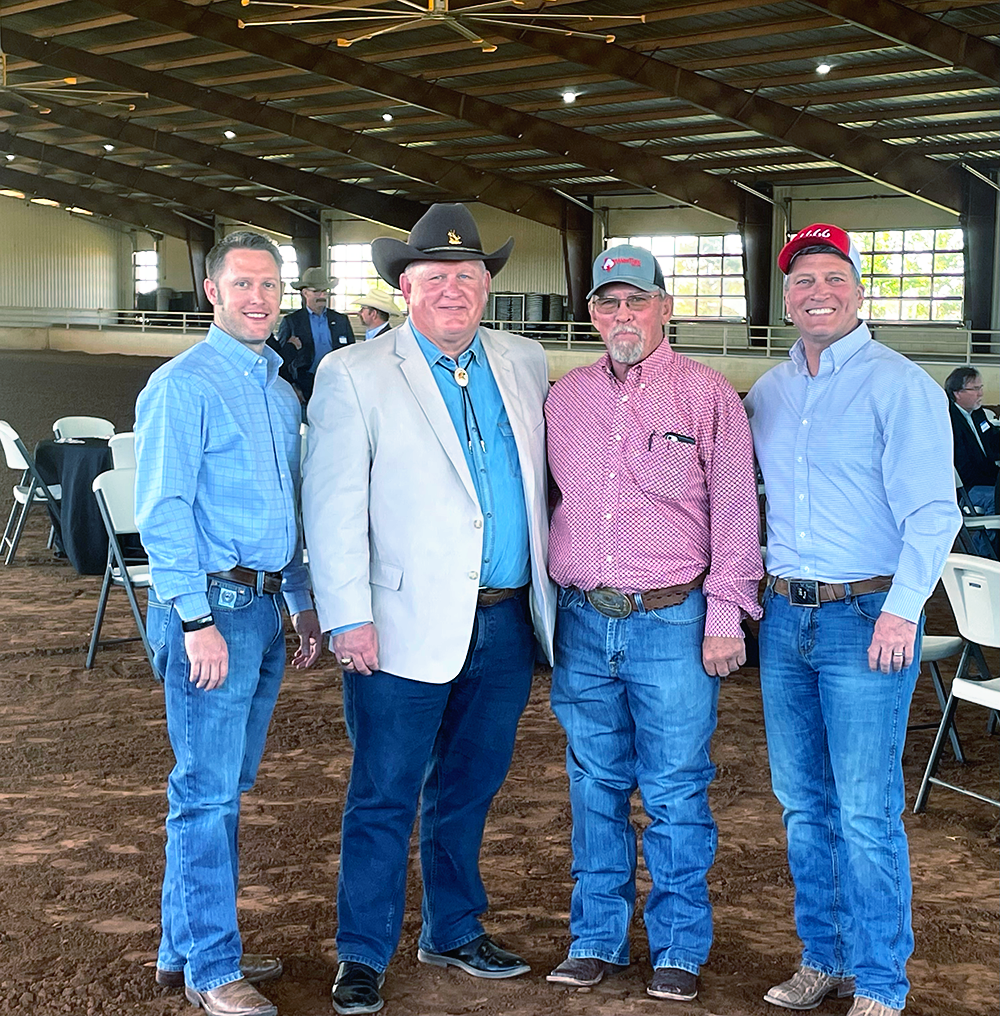
Chasing Service
How Washing a Fire Truck Led Rep. Glenn “GT” Thompson (R-Pa.) to Ranking Member of the House Agriculture Committee
By Kara Bishop
Down in the Nittany Valley at the central ridge of the Allegheny Mountains sits Howard, Pennsylvania. This metropolis in Centre County of 720 people and one traffic light is where Rep. Glenn “GT” Thompson (R-Pa.) was born and raised by loving parents. After serving during the Korean War in the U.S. Navy, Thompson’s father went to school to become a tool and dye maker. He would freeze his retirement 15 years later and build a sporting goods store in his front yard, where he and his wife ran the business together.
While most teenagers enjoyed sleeping in on the weekends, Thompson was up at 6 a.m. on Saturdays and Sundays to open the store. “What I wouldn’t give to sleep till six nowadays,” he added.
Thompson’s grandfather was a dairyman, but Thompson’s father couldn’t take over the family business as many dairy farms in the area were lost through eminent domain to build the Foster J. Sayers Dam at the Bald Eagle State Park.
“At least two generations have mostly passed since the first drops of water flowed over the spillway, heading downstream to join the Susquehanna River,” according to the Centre County Gazette. “But the children and grandchildren of the property owners most affected by the dam, or the ‘damn dam’ as they call it, still vividly recall the impact of the project on the town and surrounding farms.” It’s no surprise Thompson adamantly supports private property rights.
The farms Thompson’s family once worked are now at the bottom of a lake in Bald Eagle State Park. Thompson’s father would guide boats across the lake where the family dairy farms once stood — instead of herding cattle, he was herding fisherman. “The irony isn’t lost on me,” Thompson added.
Thompson married into the executive branch. “She was my seventh-grade class president,” he said of his wife, Penny. They were blessed to raise three boys in their hometown and the boys even graduated from the same high school as their father. “Rural living is all I’ve ever known,” Thompson added.

Rep. Glenn “GT” Thompson (R-Pa.) and “Rooster” at the Congressman’s home in Howard, Pennsylvania.
It’s been quite a journey for Thompson to become the Ranking Member of the House Agriculture Committee with some unconventional stops along the way.
Health Care
Thompson identified his life purpose at 11 years old. As a Boy Scout, he engaged in many service projects, one of which was washing the city fire trucks. Not only was it one of the highlights of his childhood — who wouldn’t want to climb all over a fire truck? — but it instilled in him a desire to make a difference in the lives of other people. To serve.
To pay for tuition while in college, Thompson worked the night shift of a local nursing home and fell in love with health care. He earned a bachelor’s degree in therapeutic rehabilitation and dual master’s degrees: one in therapeutic rehabilitation and one in health science.
Thompson spent the next 28 years working as a therapist rehabilitation services manager where he worked to restore patients’ quality of life. Sometimes restoration wasn’t possible, but that didn’t stop Thompson. A man in his late 20s had significant neurological impairment from Lyme’s disease and was living as a quadriplegic completely dependent on everyone for survival. When he came to Thompson’s rehabilitation facility, he engaged in aquatic therapy. In water, without gravity to chain him to a chair or bed, he could move his limbs and take a slight step. “We couldn’t help him achieve more mobility or independence in the long term,” Thompson said. “However, watching him achieve a minute amount of freedom while in the water was something I will never forget. Obviously, the aquatic therapy provided physical benefits, but when we got in the water, the emotional lift that man experienced could not be matched.”
More than a decade after he stopped working in therapeutic rehabilitation, people still approach Thompson and thank him for how he changed their child’s life, grandmother’s life, their own life.
From Washing the Fire Truck to Driving It
Living in a small trailer just outside of Howard with his new wife, Thompson lay awake listening to the fire whistle sound off about a mile away. Wee-oww, wee-oww, wee-oww.
He found out the next day that a structure fire had killed a young mom and her infant son.
“I couldn’t handle it,” Thompson added. “I couldn’t handle it.”
He joined the volunteer fire department that day and served just shy of 30 years — 20 of which he spent as president of the company. When asked why he became a state-certified firefighter, EMT and rescue technician, Thompson replied, “There was a need.”
The Road to Congress
Thompson was 12 years old when he won his first election: assistant patrol leader. Years later he ran for an appointment to the Bald Eagle Area School Board. Community involvement was a passion for Thompson and he decided he wanted to take it further.
Thompson ran for state representative and lost. Twice.
A few months after his last loss, Rep. John Peterson (R-Pa.) announced he would not run for reelection.
“I was heartbroken,” Thompson said. “Literally heartbroken because he was my champion. He was my go-to guy, and you would think that I would be celebrating his retirement, right? But I wasn’t.”
Eight people in the Republican Party announced they were running for Peterson’s seat before Thompson threw his hat in the ring. “I was the last one to sign up to run and had no money.” Three of his opponents spent $3.5 million on their campaigns collectively. Thompson raised $24,000 and saved some of it for the celebration party, just in case.
He won the primary by 1%.
The Congressman
After winning the election against Democratic nominee Mark McCracken by 16%, Thompson was the House representative for Pennsylvania’s 5th Congressional District — Thompson was redistricted to the 15th Congressional District in the 2018 election by order of the Supreme Court of Pennsylvania.
When he chose to serve on the House Agriculture Committee, he received many questions. “Why would you serve on the ag committee when you’re from Pennsylvania?” Pennsylvania’s biggest commodity is dairy, but it’s surprisingly diverse. According to Thompson, the state boasts the finest hardwoods, many vineyards and fruit trees in the southern region, livestock, multiple row crops are represented, and it’s the world epicenter for mushrooms. After a while though, Thompson got tired of his long explanation to that question and started saying, “I like to eat.”
His tie to the cotton industry is through his friends. “Mike Conaway (House Representative from 2005 to 2021 who served as both chair and ranking member of the House Agriculture Committee.) taught me a lot about cotton and I taught him about trees seeing as he literally had a town in his district called Notrees, Texas,” Thompson added. “He and Colin Peterson (House Representative from 1991 to 2021 who served as both chair and ranking member of the House Agriculture Committee two different times.) both educated me on the cotton industry.”
As Ranking Member of the House Agriculture Committee, Thompson has a seat at all hearings by the full committee and subcommittees. He is present at every hearing. “I work very hard to show up and participate in the subcommittee hearings scheduled — this work is important.”
Looking Toward the 2023 Farm Bill
If Thompson does chair the House Agriculture Committee in November, he plans to prioritize the upcoming Farm Bill and amp up the intensity of discussion. By this time in 2018, 100 Farm Bill hearings by full committee and subcommittees had been conducted. As of June 14, 2022, there have been 12. While frustrated by the slow progress — especially considering almost 200 members of Congress have never voted on a Farm Bill before — Thompson is ready to figure out what works and what doesn’t. “The point of these hearings is to improve upon the previous legislation,” he added. “If it ain’t broke, then don’t fix it. However, there may be some things that need tweaking to benefit our farmers, ranchers and foresters.” When asked about a possible extension of the 2018 Farm Bill, he said, “Extension is better than expiration; however, we’re going to do all we can to get a good bill passed in 2023.”

PCG CEO Kody Bessent, Rep. Glenn “GT” Thompson (R-Pa.), PCG Vice President Travis Mires, and Rep. Ronny Jackson (R-Texas), at the Four Sixes Ranch in Guthrie, Texas.
To prepare in the event he does become chair, Thompson has visited 35 states since January 2021, going on a listening tour of different agricultural sectors. In June 2021, he attended the West Texas Rural Summit and Tour in Lubbock, Texas, and surrounding areas. Plains Cotton Growers Inc. helped educate him on field research and assisted with a tour of the Meadow Farmers Cooperative Gin and Farmhouse Winery. This year, Thompson visited the Four Sixes Ranch in Guthrie, Texas, in May as well as the U.S. Department of Agriculture classing office in Memphis, Tennessee, and attended the Cotton Warehouse Association of America Annual Convention in June.
“I can learn the issues by talking to people about it, but I really like seeing it with my own eyes,” he said. “I want to experience it as the farmers, ranchers, foresters and processors experience it. It’s a blessing to meet all these folks in agriculture and an honor to bring their voices back to Washington D.C. as we work on the Farm Bill.”
While disaster assistance is a topic at hand when looking at the upcoming Farm Bill, Thompson’s concern is the possible weakening of crop insurance. “Are there trends or patterns consistently out there that should be incorporated into crop insurance? I think it’s something we need to think about when evaluating some of these existing programs. If we do implement a permanent disaster relief component, then I would like to see more timely payments.” Thompson also is cautious as to using permanent language. “If we have permanent disaster language in the bill, it will be harder to respond to the actual disasters that farmers, ranchers and foresters are responding to at any given moment.”
With inflation and input costs diminishing high market prices, Thompson is deeply concerned about profits for farm families. “At the end of the day, agriculture is a business,” he said in a Farm Bill Hearing conducted by the Subcommittee on General Farm Commodities and Risk Management. “It’s not about what you bring in — it’s about the profit margin you’re left with. Commodity prices can drop overnight, but once input costs are raised, they’re not going to come back down easily.”
While the journey wasn’t ‘traditional,’ the Boy Scout, sporting goods store worker, health care rehabilitation manager and school board member has always had one goal in mind: improve the lives of those around him. And if all goes as planned, he will chair the committee that writes the 2023 Farm Bill. If only 11-year-old GT could see himself now.
New FSA Rural Development State Director
Lillian Salerno returns to the U.S. Department of Agriculture (USDA) as the Rural Development State Director in Texas with over two decades of experience leading teams in government and industry.
Prior to her current appointment, Salerno served in the Obama-Biden Administration for six years, first as the Rural Business Administrator and later as Deputy Undersecretary for Rural Development. As Deputy Undersecretary, Lillian was a member of the White House Rural Council where she provided a voice for rural Americans and their concerns regarding economic development, innovation, entrepreneurship and access to capital for new and beginning farmers.
Salerno holds a bachelor’s degree in Latin American Studies from the University of Texas at Austin, a master’s degree in Criminal Justice from the University of North Texas and a Juris Doctor from Southern Methodist University. She is also a graduate of the Executive Leadership Program offered by Harvard University.
20th Edition Alternative Crop Guide Released
The “2022 Alternative Crop Options After Failed Cotton and Late-Season Crop Planting for the Texas South Plains” is now available. This resource can help farmers in the Texas High Plains with decisions regarding storm and wind damage, crop options, herbicides that won’t limit these options after failed cotton, and recommended planting dates for many late-season crops.
Glyphosate in the News
Discussion around Glyphosate — a widely used herbicide and the active ingredient in Bayer’s Roundup product — intensified this week, as several court decisions were announced.
Jury Decision Marks Fourth Consecutive Win in in Court for Bayer and Roundup
Last Friday, a jury concluded that Roundup did not cause an Oregon man’s cancer, which, according to Rhonda Brooks with AgWeb, marked the fourth consecutive win in court for the company.
“The jury’s unanimous verdict in favor of the company brings this trial to a successful conclusion and is consistent with the evidence in this case that Roundup does not cause cancer and was not the cause of Mr. Johnson’s (one of the plaintiffs) cancer,” Bayer said, in a prepared statement. “While we have great sympathy for Mr. Johnson, the jury has weighed the evidence from both sides in this case and concluded that Roundup is not responsible for his injuries.”
Court Rejects EPA Glyphosate Analysis
Also on Friday, the Ninth Circuit Court of Appeals ruled to reject the Environmental Protective Agency’s analysis for determining glyphosate as ‘likely not carcinogenic to people.’ According to Chris Clayton, DTN policy editor, the court ordered EPA to conduct further analysis and explanation. Clayton went on to add:
The ruling, if left standing, will force EPA to re-examine the registration of glyphosate under the Federal Insecticide, Fungicide and Rodenticide Act (FIFRA) when it comes to whether there is link between glyphosate and cancer.
The ruling came in a pair of cases filed by environmental and farm labor groups against EPA. Several major agricultural groups fighting to keep glyphosate’s registration and usage legal also had intervened in the case.
Bayer AG, in a statement to DTN, cited multiple risk assessments of glyphosate and statements from EPA on the herbicide. Most recently, EPA sent a letter to California regulators in April that the agency “continues to stand behind its robust scientific evaluation and its conclusions regarding glyphosate’s non-carcinogenicity remains consistent with many international expert panels and regulatory authorities.” EPA’s 2020 interim registration also found no association between glyphosate-based herbicides and non-Hodgkin’s lymphoma, Bayer noted.
Bayer stated: “We believe that the U.S. EPA will continue to conclude, as it and other regulators have consistently concluded for more than four decades, that glyphosate-based herbicides can be used safely and are not carcinogenic, and we are committed to working with the Agency to minimize the environmental impacts of our products. Importantly, the current product registrations remain in place and growers and other users can continue to use the products based on the current label instructions.”
U.S. Supreme Court Rejects Bayer’s Appeal in Roundup-Cancer Case
Three days ago, the U.S. Supreme Court announced its decision to deny Bayer’s bid to hear an appeal for the Roundup/cancer case “Monsanto Co. vs. Hardeman,” according to Gil Gullickson with “Successful Farming.”
Agricultural groups including the American Farm Bureau Federation, American Soybean Association, National Association of Wheat Growers, National Corn Growers Association and National Cotton Council issued the following statement regarding the court’s decision:
“We are disappointed the Supreme Court has decided not to hear this case, which has significant implications for our global food supply and science-based regulation. With the conflict in Ukraine threatening food security around the world and the persistent dangers posed by climate change, too much is on the line to allow the emergence of an unscientific patchwork of state pesticide labels that would threaten grower access to tools needed for productive, sustainable farming. We will be discussing the implications of the court’s announcement and will determine what reforms may be needed to ensure a patchwork of state labels does not jeopardize grower access to these vital tools or science-based pesticide regulation.”
References:
https://www.dtnpf.com/agriculture/web/ag/crops/article/2022/06/17/ninth-circuit-court-appeals-orders
https://www.agriculture.com/us-supreme-court-rejects-bayer-s-appeal-in-roundup-cancer-case
New SEC Rule Burdens Farm Operations
The Securities and Exchange Commission (SEC) has proposed a rule, “The Enhancement and Standardization of Climate Related Disclosures for Investors,” mandating extensive climate disclosures by public companies — including measured impacts for their entire supply chain.
According to the American Farm Bureau Federation, this rule negatively impacts many of the farmers and ranchers who feed, fuel and clothe our nation. The agriculture sector provides nearly every raw product that goes in to the supply chain, with a valued contribution of more than $1 trillion to the U.S. GDP in 2020 and employing more than 21 million people. While farmers and ranchers are not public companies and therefore not “registrants” that are required to report directly to the SEC, the obligations they would be under through their related customers could be daunting.
The proposed rule’s expansive reporting requirements for greenhouse gas emissions not only directly affects farmers’ and ranchers’ operations, but could create several substantial costs and liabilities, such as reporting obligations, technical challenges, significant financial and operational disruption and the risk of financially crippling legal liabilities.